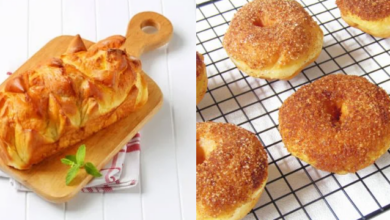Debunking The Myth: Why Brioche Is Sweet And Not Sour!
What To Know
- The amount of sugar added can vary depending on the desired level of sweetness, but most recipes call for a moderate amount to balance out the other flavors.
- When brioche is baked at a high temperature, the sugars in the dough caramelize, creating a sweet and crispy crust.
- Use the same amount of honey or maple syrup as you would sugar, and be sure to reduce the amount of liquid in the dough accordingly, as honey and maple syrup are both liquids.
Brioche, an iconic French pastry, is renowned for its distinctive golden-brown crust, fluffy interior, and a delicate sweetness that sets it apart from other breads. But what exactly makes brioche sweet? This blog post delves into the culinary secrets behind brioche’s irresistible flavor, exploring the ingredients, techniques, and processes that contribute to its sugary goodness.
The Role of Butter
Butter plays a pivotal role in the sweetness of brioche. Brioche recipes typically call for a generous amount of butter, which is incorporated into the dough through a process called kneading. As the butter is worked into the flour, it forms small pockets of air, creating a light and airy texture. The butter also contributes to the richness and flavor of the bread, adding a subtle sweetness that complements the other ingredients.
The Sweetening Effect of Milk
Milk is another key ingredient in brioche that contributes to its sweetness. Milk contains natural sugars, such as lactose, which add a subtle sweetness to the dough. The addition of milk also helps to keep the bread moist and tender, ensuring a delightful eating experience.
The Influence of Sugar
While butter and milk provide a base level of sweetness, many brioche recipes also include additional sugar. The amount of sugar added can vary depending on the desired level of sweetness, but most recipes call for a moderate amount to balance out the other flavors. Sugar not only enhances the sweetness but also helps to caramelize the crust, giving brioche its characteristic golden-brown color.
The Role of Eggs
Eggs are another important ingredient in brioche that contributes to its sweetness. Eggs provide richness and structure to the dough, but they also contain small amounts of sugar. The yolks, in particular, contain more sugar than the whites, so using whole eggs in brioche dough results in a slightly sweeter flavor.
Fermentation and Yeast
The fermentation process, which is essential for all breads, also plays a role in the sweetness of brioche. When yeast is added to the dough, it consumes the sugars in the flour and converts them into carbon dioxide gas. This gas creates bubbles in the dough, causing it to rise. As the dough rises, the yeast continues to ferment, producing additional sugars that contribute to the overall sweetness of the bread.
The Baking Process
The baking process itself also influences the sweetness of brioche. When brioche is baked at a high temperature, the sugars in the dough caramelize, creating a sweet and crispy crust. The caramelization process also enhances the flavor and aroma of the bread, making it even more irresistible.
Summary: Unveiling the Sweet Secrets of Brioche
In conclusion, the sweetness of brioche is a complex interplay of ingredients, techniques, and processes. Butter, milk, sugar, eggs, fermentation, yeast, and baking all contribute to creating a bread that is both light and airy, rich and flavorful, and undeniably sweet. Understanding these culinary secrets allows home bakers and pastry enthusiasts alike to recreate this exquisite pastry in their own kitchens, bringing a touch of French indulgence to their tables.
Quick Answers to Your FAQs
1. Can I adjust the sweetness of brioche by adding more or less sugar?
Yes, the amount of sugar added to brioche dough can be adjusted to suit your taste preferences. If you prefer a sweeter brioche, add an additional tablespoon or two of sugar. For a less sweet brioche, reduce the amount of sugar by the same amount.
2. Can I use honey or maple syrup instead of sugar in brioche dough?
Yes, you can substitute honey or maple syrup for sugar in brioche dough. Use the same amount of honey or maple syrup as you would sugar, and be sure to reduce the amount of liquid in the dough accordingly, as honey and maple syrup are both liquids.
3. What are some tips for enhancing the sweetness of brioche without adding more sugar?
- Use high-quality butter with a rich flavor.
- Proof the dough in a warm place to allow the yeast to fully develop and produce more sugars.
- Bake the brioche at a high temperature to caramelize the sugars in the dough.
